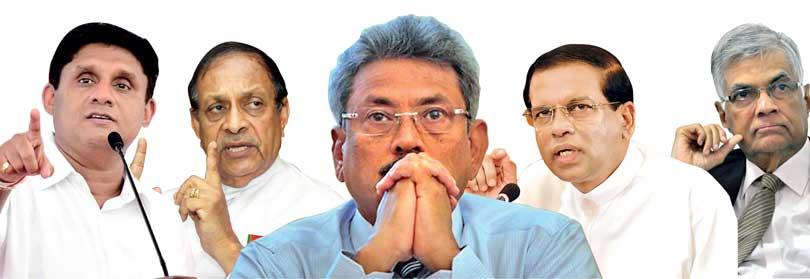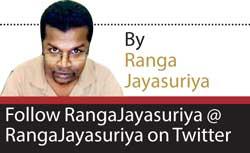27 Aug 2019 - {{hitsCtrl.values.hits}}

 Gotabaya Rajapaksa is the clear front runner in the presidential race; even before the UNP names its candidate, the former strongman- Defence Secretary is cruising ahead with say, around a 10 per cent lead in the South.
Gotabaya Rajapaksa is the clear front runner in the presidential race; even before the UNP names its candidate, the former strongman- Defence Secretary is cruising ahead with say, around a 10 per cent lead in the South.
The UNP’s choice of its candidate and whether the Grand Old Party would remain a unified group after that would decide whether the presidential election would be a one-horse race.
Probably by harnessing the floating vote of the Sinhalese electorate, many of whom are not happy with Mr. Rajapaksa’s dictatorial tendencies, and winning at least 80 per cent of minority votes, and encouraging both groups to go and vote on election day, the UNP can perhaps make a difference.
Probably, it can build a large coalition that brings together the full scope of the diversity of the Sri Lankan electorate around a few issues of truly national significance. It can field a candidate who is acceptable to the Sinhalese Buddhists, the minorities, and the aspiring independent-minded youth. That candidate can promise to relinquish all party affiliations if he gets elected, and provide a non- partisan national leadership. Probably the only candidate within the UNP ranks who can pull this off is Karu Jayasuriya; such a gamble could well pay off as the election of Maithiripala Sirisena paid off in 2015.
However, such a pragmatic posture is increasingly becoming wishful thinking in the UNP, as it is being dragged into a self- destructive fratricidal war. The most rebellious of its parliamentary members are also the most ignorant of the impulses of the Sri Lankan electorate. They are replaying crude poverty porn that worked in 1988, and think it would work 30 years later in a country that was recently elevated to the Upper Middle -Income bracket. In the meantime, Mr Rajapaksa is offering high-speed internet, English and a network of technical colleges. In contrast, Sajith Premadasa, a probable UNP contender is promising ‘Uda Gamas’. That absence of a vision and ambition held back this country from replicating the economic success of East and South East Asia in the past. A range of South American countries, such as Brazil, Venezuela and Argentina are now taking the brunt of economic fallout due to similarly extravagant public spending by a cohort of left leaning leaders who ruled until recently.
In a rather utilitarian view of history, the self -serving machinations to prop up a dependency culture, as manifest in the pre-election campaign of the UNP is far more dangerous than the White vans that Mr. Rajapaksa is accused of unleashing on the dissent and the government critics.
Probably, Gotabaya Rajapaksa is the best candidate for the economy. That might remain true even if the UNP nominated its most go-getter candidate (only if it could find such).
That is because economic development is much more than economic promises outlined in the election manifestos or micro and macro- economic handling by the Central Bank.
Countries at our level of economic development need a government that is capable, competent and forceful enough to act as the catalyst of economic development. It has been empirically proven that the economic success of East and South-East Asian countries such as South Korea, Taiwan, Singapore, Malaysia and post-reform China are intrinsically related to the pro-active role played by pro-growth authoritarian regimes that were in power during their high growth period. Of all successive Sri Lankan governments in recent times, only the Mahinda Rajapaksa regime, which unleashed a massive state-led infrastructure development program came closer to this.
A government that desires to play the catalyst of economic development should have the political will, forcefulness and competence to push through, and if needed bulldoze its economic agenda, across a vast array of competing interests of stakeholders. Electoral democracies in the developing world remain poor because their governments were lacking in these attributes. Those who got that right, from Chiang Kai Shek’s Taiwan, Pinochet’sChile and the CPC of China are not the most benignly governed. But, they uplifted millions, China alone
600 million, from poverty.
Fast -track economic development like everything else has its trade-offs. Irrespective of moralistic uproar, short term pain often pays off in the long term economic prosperity.
The Yahapalanaya and the UNP reigned over four ‘lost years’ of economic development. Its economic performances were not a patch on its predecessor. The differential performances are striking for both the UNP and the SLFP (SLPP) have adopted similar free market economic policies. In fact, the primary difference lies in the competence and efficiency with which respective economic visions were followed. Hence the deferential performances are largely down to the personalities; the UNP leadership and his coterie lacked both decisiveness and a sense of urgency that every developing state should have in catching up with economic growth. It is unlikely that these personalities would be different under a future UNP government.
This would make many undecided voters ponder whether it is worth the while to give the UNP another chance. Mr. Rajapaksa with a stellar record of Colombo city development as the secretary of urban development ministry inspires more confidence.
The UNP’s failure over the past four and half years is now amplified by the lack of originality and a vision. Aspiring Sri Lankans are sick of self -serving paternalism and effort to invoke a diminishing trait of a dependency culture of the Sri Lankan populace.
Any UNP-led grand alliance should address this lacuna. To begin with that, it should first take stocks of the seminal failure of economic development during the past four and half years. If it had launched at least one large economic development project of its own, things would not have been this harder.
09 Jan 2025 1 hours ago
09 Jan 2025 3 hours ago
09 Jan 2025 3 hours ago
09 Jan 2025 3 hours ago
09 Jan 2025 4 hours ago